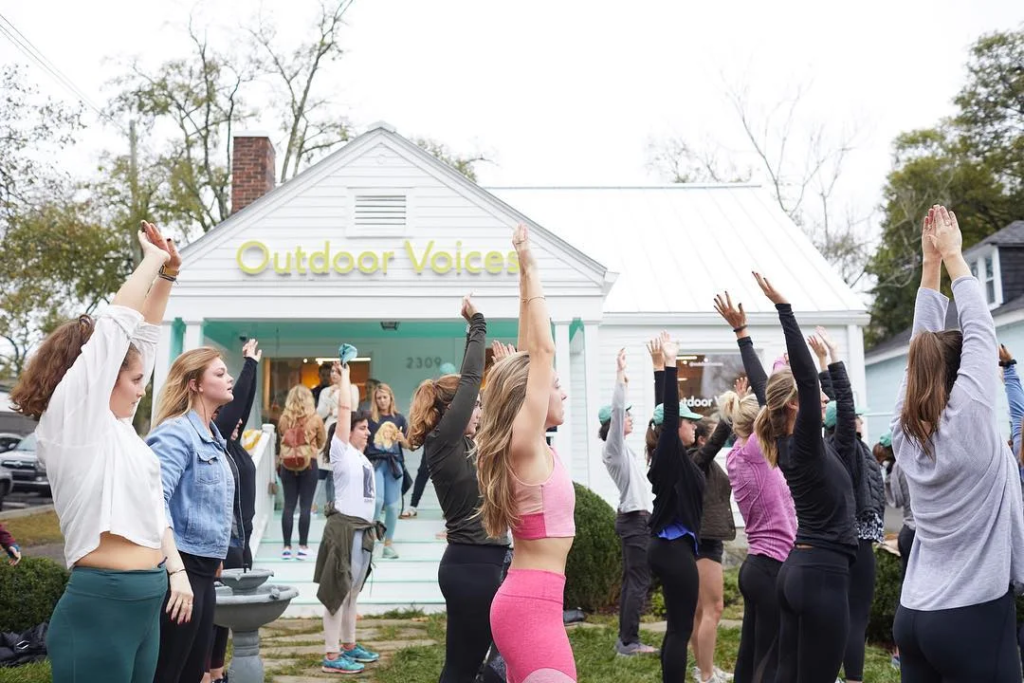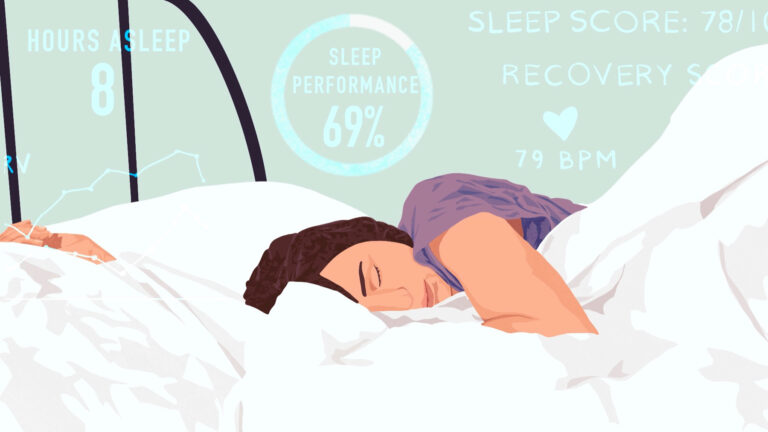Way back in Issue No. 12, we explored The Evolution of Athleisure. More specifically, we took stock of the challenges and opportunities facing established players and upstart brands alike.
In the time since, a number of new developments have reshaped the activewear space. From leadership changes to new entrants and the continued crossover with fitness and wellness, the competition for the sweaty consumer has only intensified. Now, brands are deploying increasingly differentiated strategies to stand out in a crowded landscape.
Zooming out: the evolution of athleisure might be less about retail itself and more about the customer experience. With that, a new athleisure playbook has started to take shape. More than ever, doubling down on community, leveraging celebrities and collaborations, and creating an immersive shopping environment has become paramount to success.
Going deeper: here’s how those strategies are being deployed to redefine an entire category.
Commerce and Community
Tapping social media influencers to promote your product is pretty much table stakes. But lululemon was utilizing influencers long before Instagram became a shopping destination. In hindsight, the success of the company’s hyper-local ambassador program has proven to be their secret sauce. And now, it’s a blueprint for activewear brands everywhere.
As a former lululemon ambassador, I can personally attest to the program’s impact. Beyond free gear, the company hangs giant photos of its ambassadors in the store and invites them to teach in-store classes. As a result, everyone’s favorite local instructor becomes the face of the brand, making lulu synonymous with community to the end customer.
More than grassroots marketing, though, lululemon actually utilizes ambassadors. A few years back, I was invited to attend the Global Ambassador Summit at the company’s headquarters in Vancouver, Canada. Nearly 100 ambassadors were flown in from around the world—and put up at the Four Seasons in Whistler, no less—to meet with executives and product teams, creating a direct line of communication with its customers and community.
Looking at the athleisure landscape, “community” is central to the category.
- With events like its adorable Dog Jog, Outdoor Voices lives its “Doing Things” motto.
- Tracksmith’s storefront, the Trackhouse, is a hub for all things running in Boston.
- WOLACO recently partnered with popular NYC fitness studios for a loyalty program.
- Combining online and offline marketing helped Gymshark scale ‘19 revenue to $300M.
Given the overlap with fitness, athleisure’s continued emphasis on community is logical and necessary. Tapping into the team or tribe mentality can help brands become deeply ingrained with the sweat experience. So much so, that retailers are reimagining their stores to bring the workout in-house.
If you build it… For retailers, fitness has become the top of the funnel marketing. For consumers, it’s another opportunity to sweat and socialize. This fact helps explain why lululemon’s new flagship store has a fitness studio. It also helps explain why Kohl’s is partnering with Planet Fitness, while JCPenney and Free People add dedicated fitness spaces to their stores.
For Equinox and SoulCycle, the inverse is also true — fitness is a funnel to retail. The Shop @ Equinox has become a launchpad for activewear brands like Rhone, WOLACO, Ten Thousand, and many others. Meanwhile, SoulCycle is doubling down on its DTC retail ambitions. As Glossy points out, the indoor cycling company is transforming into a full-fledged direct-to-consumer fashion brand.
The Battle For Cool
From Bo Jackson to Michael Jordan and LeBron James to Tiger Woods, there’s nothing new about brands tapping pro athletes to promote their products. More recently, though, the battle for cool has gone beyond the playing field to include musicians and celebrities with unmatched relevance in pop culture.
While Nike partnered with Kevin Hart and Under Armour inked The Rock, adidas is charting a new path with “creatives”. The success of Kanye West’s Yeezy line has given rise to partnerships with Pharrell Williams, Donald Glover, and Pusha T among others. And watch adidas’s latest partnership, a collaboration with Beyoncé on her IVY PARK activewear line, as it is expected to surpass Yeezy’s $1.5B empire.
While billion-dollar brands can afford to back celebrities, smaller companies have to get more creative in the quest for cool. Vying for relevance among a niche audience, many fast-growing upstarts have mastered the collaboration.
Although Outdoor Voices has its fair share of celebrity admirers, the brand isn’t one for endorsements. Instead, they’ve used collaborations to drum up attention. From Madewell and Merrell to Rapha and Allbirds, OV knows how to generate buzz with one-of-a-kind product drops.
Like community, collaborations are another area where fitness and activewear brands converge. On its Barry’s Shop website, Barry’s Bootcamp features collaborations with lululemon and Balmain creative director Olivier Rousteing. Similarly, Peloton has previously released capsule collections with Fila and Outdoor Voices, while also dropping Peloton-branded gear from Athleta, Hill City, and Vuori among others.
Looking Ahead
In the US, activewear represents a $57.6B market. Globally, that number is expected to reach $567B by 2024. With their focus fixed on this growing opportunity, large companies and smaller newcomers will seek out innovative ways to stand out. For instance, consider these recent headlines:
- Playing up sustainability, Everlane dropped its activewear line.
- Focusing on affordability, Target unveiled All in Motion, its new athleisure line.
- Inclusive sizing is trending, setting Year of Ours apart from the competition.
Punchline: As is often the case, each passing day renders any “new” playbook increasingly obsolete. And athleisure is no exception. From high-tech gear to high fashion and emerging markets abroad, the updated playbook is already taking shape.
💵 Bullish on Boutique Fitness?
There’s no denying the disruptive force that is connected fitness. But boutique fitness is still big business. And, in case you need a reminder, consider these recent headlines:
- Xponential Fitness, the fitness franchisor and owner of eight boutique concepts including CycleBar and Club Pilates, is preparing an IPO that could raise $300M at a $1B valuation.
- F45 Training has confidentially filed for a public offering. With 1,500 studios, the company hopes to reach 10K locations globally. Last year, Mark Wahlberg bought a minority stake in the company, a $450M valuation.
- ClassPass, the boutique fitness and wellness passport, raised $285M in new funding, valuing the company at more than $1B.
What now? In the near-term, the prospects of three (or more… looking at you, Orangetheory Fitness) public offerings are sure to complicate the conversation around oversaturation and consolidation in the fitness space. On one hand, the demise and subsequent sale of Flywheel to Town Sports seem to strengthen the gympocalyse argument. On the other hand, a run of fitness IPOs makes predicting the imminent demise of fitness studios difficult.
😬 Tough Times
Obstacle race organizer Tough Mudder is in a tough spot. According to Bloomberg, the company owes creditors nearly $900K. As a result, those creditors have filed an involuntary petition to put the company into bankruptcy.
- Since 2013, Tough Mudder has lost money every year except 2015.
- Over the past five years, search interest in Tough Mudder has declined (h/t Trends).
- Spartan Race intended to acquire Tough Mudder, but the bankruptcy has complicated those plans.
Takeaway. To many onlookers, obstacle course racing always felt like a fad. And the collapse of many organizers has proven naysayers right. But, as Tough Mudder falls on difficult times, Spartan Race founder Joe De Sena is seeking to capitalize on the collapse. According to De Sena, that includes making obstacle racing an Olympic sport. Hey, shoot for the moon, right?
📰 News & Notes
- How Strava became a religion.
- CrossFit thinks it’s the future of healthcare.
- Meditation apps are basically a paid podcast.
- The US supplement laws need to be updated.
- SLT expands, the Tread studio combines reformer Pilates and running.
- Mix-in adaptogen maker Moon Juice launched a skincare line.
- Tonal, the smart strength training system, is now available in your hotel room.
💰 Money Moves
- Califia Farms, the plant-based food and beverage brand, raised $225M in Series D funding. More from Fitt Insider: The Future is Plant-based
- Good Catch, makers of plant-based seafood products, secured a $32M investment round, with Greenleaf Foods and 301 INC, the venture arm of General Mills, participating.
- Modern Health, a mental health benefits platform for employers, closed a $31M Series B funding round. More from Fitt Insider: Wellness Confronts Mental Health
- Peerfit, a digital health platform connecting employers and carriers with personalized fitness experiences, raised $10M in new funding. For More: Listen to Peerfit CEO Ed Buckley on the Fitt Insider podcast.
- UK-based Elder landed £8.2M to provide personalized in-home care to aging populations.
- Cann, the cannabis-infused drink company, raised $5M in new funding. More on Fitt Insider: Cannabis and Wellness Converge
- Vivoo, providers of custom nutrition advice based on urine sample analysis, secured $1M in seed funding from Draper Associates.
- Techstars teamed up with Melinda Gates’ investment and incubation company, Pivotal Ventures, to launch the Techstars Future of Longevity Accelerator. More on Fitt Insider: Longevity Startups Attempt to Cure Aging.
- Fresh Bowl, the salad and snack vending machine company, raised $2.1M in seed funding.






